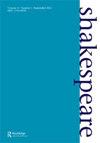Santiago : Making Bilingual Shakespeare Count
IF 0.2
3区 文学
0 LITERATURE, BRITISH ISLES
引用次数: 0
Abstract
ABSTRACTSantiago is a bilingual script of Othello, created jointly by Joe Falocco of Texas State University and Shakespearean scholar and translator Alfredo Michel Modenessi. Developed during spring 2023, it was performed as a staged reading at the 51st Annual Shakespeare Association of America Conference. This production directed by Maija Garcia of the Guthrie Theatre's Professional Training Program, featured a BIPOC and Latine cast. In performance, the script offered new perspectives on Othello, shifting focus away from Othello and Desdemona and highlighting Iago and Emilia instead. Santiago thus seems less concerned with issues of race and colourism than with questions of religious and cultural identity, especially as marked by linguistic power founded upon the ability to code-switch with ease between two languages, in this case, (Shakespeare's) English and (Modenessi's) Spanish. An extended interview with Falocco, Modenessi, and the two Texas State actors who voiced in Minneapolis examines these claims; a coda then places Santiago into wider conversation with prior scholarship on the nature of translation, issues of Othello and race, and the newly emergent field of Borderlands Shakespeare.KEYWORDS: OthellotranslationShakespearean performanceLatine ShakespeareBorderlands Shakespeare Disclosure StatementNo potential conflict of interest was reported by the author(s).Notes1 Buffone and Della Gatta, ‘Introduction: Shakespeare and Latinidad’, 3.2 Gillen, Santos, and Santos, ‘General Introduction’, xv–xxxii.3 Falocco, ‘Echoes of Cervantes’, 8.4 Little, ‘Introduction’, 6.5 Ibid., 9.6 Kendi, How to be an Antiracist, 40.7 Little, ‘Introduction’, 4.8 Ibid., 14.9 Bevington, The Complete Works of Shakespeare, ‘Antony and Cleopatra’, 1.5.29.10 Bevington, The Complete Works of Shakespeare, ‘Merchant of Venice’, 2.1.2–4.11 Bevington, The Complete Works of Shakespeare, ‘Othello’, 3.4.29–30.12 Falocco, ‘Echoes of Cervantes’, 2–4.13 Quoted in Falocco, ‘Echoes of Cervantes’, 3.14 Cobb, King, and Kello, ‘A Theatre Practice’, 205.15 Ibid., 206.16 Rekskou, ‘Translating Richard’, 98–100.17 Modenessi, ‘Every Like is not the Same’.18 Joubin, ‘Others Within’, 31–33.19 Schroeder-Arce, ‘Shakespeare with … Latinx Youth’, 128–35.20 Thompson, ‘Practicing a Theory’, 1–26.21 Modenessi, ‘You Say’, 40–42.22 Falocco, ‘Lleno de Tejanidad’, 170–77.23 Botelho, ‘De-Emphasizing Race’, 370–74.24 De Sousa, ‘Introduction’, 137.25 Corredera, ‘The Moor Makes a Cameo’, 359–60.26 Gillen, Santos, and Santos, ‘General Introduction’, xv–xxxiii.27 Ibid., xv–xvi.28 Espinosa, ‘Don’t It Make My Brown Eyes’, 57.圣地亚哥:让双语版莎士比亚更有价值
摘要《圣地亚哥》是由美国德克萨斯州立大学的乔·法罗科和莎士比亚学者、翻译家阿尔弗雷多·米歇尔·莫德内西共同创作的《奥赛罗》双语版本。这部作品创作于2023年春季,在第51届美国莎士比亚协会年会上作为舞台朗诵。这部作品由格思里剧院专业培训计划的Maija Garcia执导,以BIPOC和拉丁演员为特色。在表演上,剧本为奥赛罗提供了新的视角,将焦点从奥赛罗和苔丝狄蒙娜转移到伊阿古和艾米莉亚。因此,圣地亚哥似乎不太关心种族和肤色问题,而更关心宗教和文化认同问题,尤其是以语言能力为标志,这种能力建立在两种语言之间轻松转换的能力之上,在这种情况下,(莎士比亚的)英语和(Modenessi的)西班牙语。通过对Falocco、Modenessi和两位在明尼阿波利斯配音的德克萨斯州演员的长时间采访,我们检验了这些说法;在结尾部分,圣地亚哥与之前的学者就翻译的本质、奥赛罗和种族的问题、以及新出现的莎士比亚的边疆领域展开了更广泛的对话。关键词:奥赛罗翻译莎士比亚戏剧莎士比亚边疆莎士比亚披露声明作者未报告潜在利益冲突。注1:布冯和德拉·加塔,《导论:莎士比亚和拉丁人》,3.2吉伦、桑托斯和桑托斯,《一般导论》,第15 - 32页法洛科,《塞万提斯的回声》,8.4利特尔,《引言》,6.5同上,9.6肯迪,如何成为一个反种族主义者,40.7利特尔,《引言》,4.8同上,14.9贝文顿,《莎士比亚全集》,《安东尼与克利奥帕特拉》,1.5.29.10贝文顿,《莎士比亚全集》,《威尼斯商人》,2.1.2-4.11贝文顿,《莎士比亚全集》,《奥赛罗》,3.4.29-30.12法洛科,《塞万提斯的回声》,2-4.13法洛科引用,《塞万提斯的回声》,3.14科布,金和凯洛,《戏剧实践》,205.15同上,206.16 Rekskou,“翻译理查德”,98-100.17 Modenessi,“每个喜欢都不一样”。18朱宾,“他人内部”,31-33.19施罗德-阿尔塞,“莎士比亚与……拉丁青年”,128-35.20汤普森,“实践理论”,1-26.21莫德内西,“你说”,40-42.22法洛科,“莱诺德·特贾尼达”,170-77.23波特略,“不强调种族”,360 - 74.24德·索萨,“介绍”,137.25科雷德拉,“摩尔人客串”,359-60.26吉伦,桑托斯和桑托斯,“一般介绍”,xv - xxxii .27如上,xv-xvi.28埃斯皮诺萨,《别让我的眼睛变成棕色》,57岁。
本文章由计算机程序翻译,如有差异,请以英文原文为准。
求助全文
约1分钟内获得全文
求助全文
来源期刊

Shakespeare
Multiple-
CiteScore
0.30
自引率
33.30%
发文量
37
期刊介绍:
Shakespeare is a major peer-reviewed journal, publishing articles drawn from the best of current international scholarship on the most recent developments in Shakespearean criticism. Its principal aim is to bridge the gap between the disciplines of Shakespeare in Performance Studies and Shakespeare in English Literature and Language. The journal builds on the existing aim of the British Shakespeare Association, to exploit the synergies between academics and performers of Shakespeare.
 求助内容:
求助内容: 应助结果提醒方式:
应助结果提醒方式:


